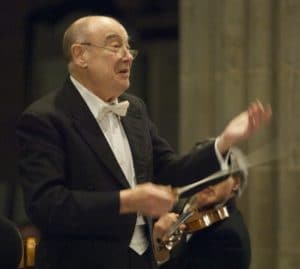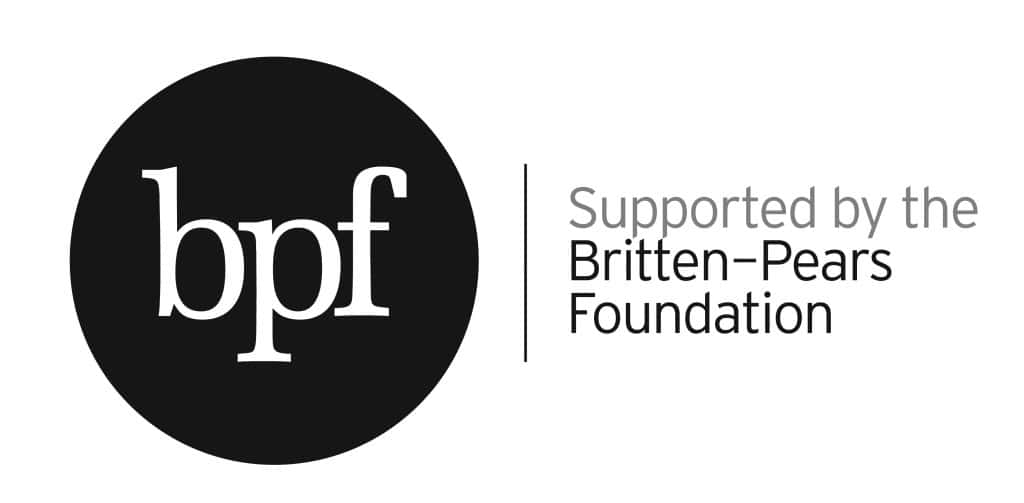VERNON HANDLEY
Vernon “Tod” Handley succeeded William Boughton as principal conductor of the ESO in 2007, and led the orchestra until his death in 2008. ESO leader Michael Bochman shares this reminiscence of Tod’s time with the ESO:
“Everyone called him Tod. And the respect and affection for him was total. His beat was everything according to him. He was incredibly clear with the baton and everyone knew exactly what to do when and when something went wrong he always blamed himself. Whether this was really the case or a ruse one never quite knew! He always got the best out of everyone and scarcely ever criticised. He enabled. This meant that every musician was both playing for him/herself and Tod and everyone at the same time. He once said that if you stand in front of an orchestra with your palms up you enable and with palms down you impose. It was one of a myriad of small human points that made him what he was. He made everyone realise their best self. There was an atmosphere of friendliness and amusement in all rehearsals but the music making was completely in earnest. His understanding of English music was the best of his generation, I believe. His enthusiasm for it was probably what stopped him from achieving the dizzy heights of stardom. I think this annoyed him. Personally I preferred him as he was.”

Vernon Handley’s first professional engagement was in 1960, conducting the Bournemouth Symphony Orchestra. In 1962, Handley was appointed the musical director of the newly formed Guildford Philharmonic Orchestra, with which he programmed much of Bax’s music and made the first recording of Bax’s Symphony No.4. Handley and the orchestra also recorded Gerald Finzi’s Intimations of Immortality. He also directed the Tonbridge Philharmonic orchestra. In 1983 he was appointed associate conductor of the London Philharmonic Orchestra. He was Principal Conductor of the Ulster Orchestra from 1985 to 1989, and had the title of Conductor Laureate from 2003 until his death. From 1986 to 1988, he was chief conductor of the Malmö Symphony Orchestra. He held assistant conductorships elsewhere, was Conductor Emeritus of the Royal Liverpool Philharmonic Orchestra, and conducted a number of others in concert, for broadcast and for recording. Handley was appointed Principal Conductor of the English Symphony Orchestra in January 2007.
Handley is much revered for his enthusiastic and untiring championship of British music, including many lesser known, unfashionable or relatively neglected composers whose artistic reputations and popularity he often helped to revive. Although he claimed to be just as attached to composers from elsewhere, the majority (some 90 out of 160) of Handley’s recordings were of British music. He is said to have recorded as many as a hundred premières of British works, including highly successful series on Hyperion Records of the symphonies of Robert Simpson and Sir Granville Bantock. Simpson dedicated his Symphony No.10 to Handley. According to Lewis Foreman, Handley “single handedly transformed the reception of the music of Granville Bantock.” He also went on to make the first largely complete official recording of Bantock’s monumental Omar Khayyám setting. He contributed a foreword to Alan Poulton’s Dictionary-Catalog of Modern British Composers (Greenwood Press) and to a book on Adrian Boult. He also recorded symphonies by Bax, Moeran and Stanford for Chandos Records as well as discs of other orchestral works. Handley recorded the symphonies of Elagr and Vaughan Williams for EMI. Handley also recorded many works by Sir Malcolm Arnold for Conifer Records, which have recently been reissued in the UK by Decca Records.
Handley held clear views on the style of conductors, saying “Music isn’t mime; you shouldn’t fraudulently convince people that they have heard what they haven’t”, and stating “jet-set musical careers… are little to do with the work, more to do with PR”.[4] Questioning the influence of television on conducting, Handley recalled Boult telling him, “Do remember, won’t you, that you are playing to the blind man in the audience.”
Handley received numerous awards, such as The Gramophone magazine’s Special Achievement Award in 2003 for services to British Music (sparking a “Nod for Tod” honours campaign); and the Lifetime Achievement Award at the Classical BRIT Awards on 3 May 2007 at the Royal Albert Hall. He was appointed a Commander of the Order of the British Empire (CBE) in the 2004 Queen’s Birthday Honours (having declined appointment as an Officer of the order in 1988). He held an Honorary Doctorate from the University of Surrey and was a Fellow of the Royal COllege of Music.
Handley died at home in Monmouthshire on 10 September 2008. He had been scheduled to conduct Prom 2 of the 2008 BBC Proms season on 19 July, but withdrew because of ill health (Paul Daniel replaced him). After Handley’s death, the director of The Proms, Roger Wright, announced the dedication of the 10 September Prom concert (Prom 73) to Handley.
Handley married three times. He met his first wife, Barbara Black, while studying at Balliol; they married in 1954 and had a daughter and two sons, one of whom died when aged 13 months. His second marriage in 1977 to Victoria Parry-Jones produced a son and a daughter. His third marriage to the flautist Catherine Newby in 1987 produced a son. The five remaining children survive Handley.






